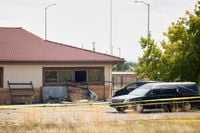Two years after the shocking discovery of nearly 200 decaying bodies in a rural Colorado building, the man at the center of one of the most disturbing funeral home abuse scandals in recent memory was set to be sentenced on Friday for 191 counts of corpse abuse. The case of Jon Hallford, owner of the Return to Nature Funeral Home in Colorado Springs, has left a community reeling and exposed glaring holes in the state’s oversight of the funeral industry.
According to ABC News and corroborated by multiple sources, it was in 2023 that a putrid smell began seeping from a nondescript building in Penrose, a small town about 35 miles from Colorado Springs. When police arrived, what they found inside was nothing short of grisly: bodies piled in a bug-infested, room-temperature facility, many decomposed beyond recognition, some lying unclothed in inches of bodily fluids. The scene was so hazardous that investigators donned hazmat suits to painstakingly extract the remains.
For four years, Hallford and his wife, Carie, assured grieving families that their loved ones had been respectfully cremated. In reality, the couple had stashed the bodies in the Penrose building and handed out containers filled with dry concrete, passing them off as ashes. The deception unraveled the grieving process for countless families, robbing them of closure and trust. "To me it’s the heart of the case. It’s the worst part of the crime," said Tanya Wilson in comments reported by the Associated Press. Wilson, who traveled from Georgia to speak at the sentencing, had hired the Hallfords to cremate her mother. She later discovered that the ashes her family spread in Hawaii were not her mother’s at all—her mother’s body had been left to decay in Penrose.
The scale of the crime was staggering. Authorities ultimately accused the Hallfords of allowing 189 bodies to decay, and in two separate cases, burying the wrong bodies. To this day, four remains have yet to be identified, according to Kate Singh of the Fourth Judicial District District Attorney’s Office. The Hallfords first obtained a license for their funeral home in 2017, but by 2019, bodies were already piling up. Many of the deceased languished for years, decomposing in appalling conditions.
Friday’s sentencing hearing focused on state charges related to the mistreatment of bodies—191 counts in total. Hallford had already pleaded guilty to federal fraud charges and was headed to prison. The plea agreement called for a 20-year prison sentence on the corpse abuse charges, but there was a twist that left many families outraged: the state sentence was expected to run concurrently with his 20-year federal sentence. That could mean Hallford would serve far less time than the families of the victims believe is just.
Wilson and other affected families pressed Judge Eric Bentley to reject the plea deal. “The scale of this is staggering. Why does the state believe they deserve a plea deal? There needs to be accountability,” Wilson insisted, echoing the frustration and anguish of many who had trusted the Hallfords with their loved ones’ final arrangements. If the judge were to reject the agreement, the case would not end there—it would likely proceed to arraignment, the first step toward a criminal trial.
The story of the Hallfords is not just about one couple’s crimes; it’s a symptom of a broader regulatory failure. Colorado, as noted by ABC News and other outlets, has long struggled to effectively oversee funeral homes. For years, the state has had some of the weakest regulations in the nation, and the Return to Nature scandal is not an isolated incident. Just this week, authorities discovered an estimated 20 decomposing corpses at a funeral home in Pueblo, underscoring the need for systemic reform.
Carie Hallford, Jon’s wife, pleaded guilty to the same crimes. Her sentencing on the corpse abuse charges has yet to be scheduled, though she faces a December sentencing in the federal fraud case. The couple’s crimes went far beyond corpse abuse. During the same period they were deceiving families, they defrauded the federal government out of nearly $900,000 in COVID-19 aid. With their ill-gotten gains, the Hallfords purchased luxury items from Tiffany & Co., a GMC Yukon and an Infiniti worth a combined $120,000, laser body sculpting treatments, and $31,000 in cryptocurrency.
The Hallfords’ arrest came more than a month after the bodies were discovered, when they were found in Oklahoma, where Jon Hallford had family. The fallout from their actions has been profound and deeply personal for the families involved. Many learned, often in the most painful ways, that their moments of catharsis—spreading a mother’s ashes in Hawaii, cradling a son’s urn in a rocking chair—were based on a lie. The deception tore away the signposts of the grieving process, unraveling months and years of emotional work.
Some families, like that of Crystina Page, demanded to witness the proper cremation of their loved ones after their bodies were recovered. Page insisted on being present as her son’s body was cremated for real, a moment that, while painful, finally offered a measure of closure. Wilson’s family, too, cremated her mother’s remains after recovery, and she plans to return to Hawaii to spread the ashes—this time, knowing they are truly her mother’s—once the court cases conclude.
Jon Hallford has appealed his federal prison sentence, and Carie Hallford’s sentencing for the federal fraud charges is scheduled for December. But for many families, no sentence will ever truly restore what was lost. The Return to Nature scandal has prompted calls for tighter regulation and oversight of funeral homes in Colorado, but as the state grapples with repeated cases of abuse, the question remains: will it be enough to prevent another tragedy like this?
The pain and betrayal felt by the victims’ families have left deep scars, but their voices—speaking out in court and demanding accountability—may yet help drive the change needed to protect others in the future.



